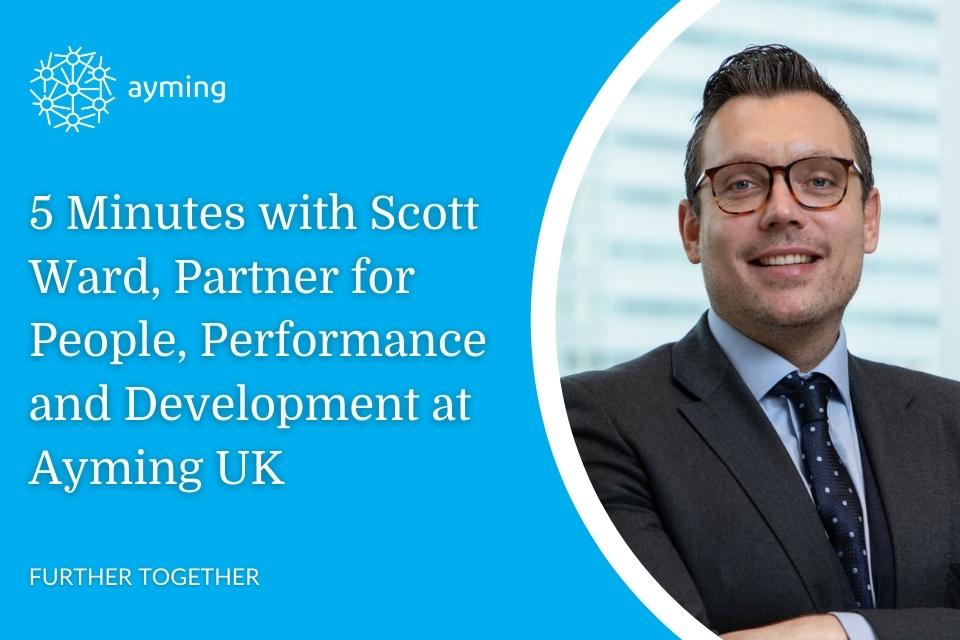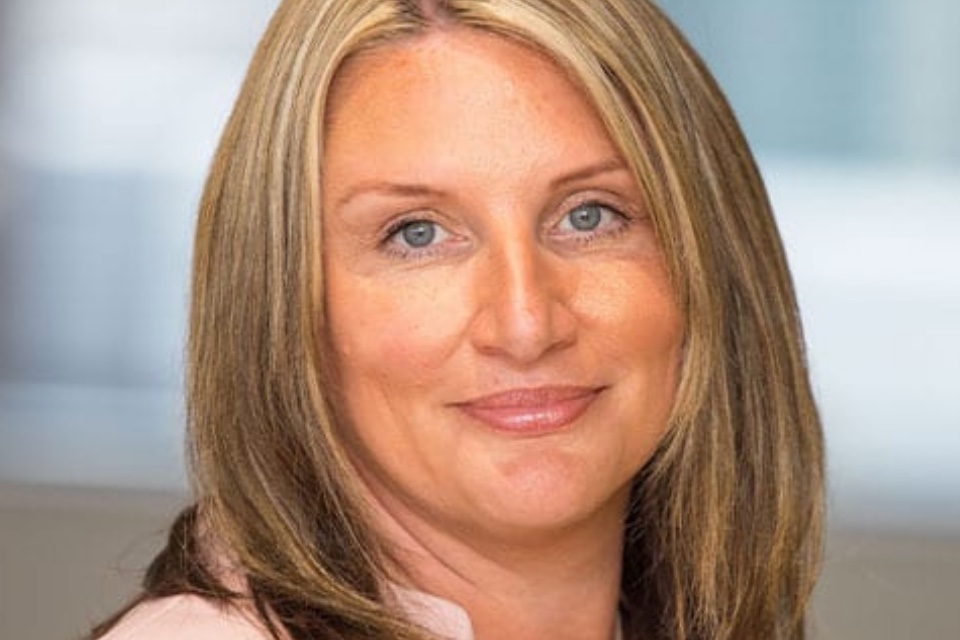In the latest instalment of our HR industry executive interview series, we sat down with Scott Ward, Partner for People, Performance and Development at Ayming UK, to talk about digital transformation, a renewed focus on mental health, and the company’s unique framework…
Tell us about your company, products and services.
The first step to optimising performance is realising that people are your most valuable assets.
Across cultures and belief systems, compassion is widely considered beneficial for developing personal and social wellbeing or change. Following the vast impact of Covid-19, empathy, people development and awareness will lead the conversations for the time to come.
Through years of delivery, research, and lived experience, Ayming has created a people-led approach incorporating digital transformation with data and consumable globally certified content focused on compassion, understanding and empathy. Together with you, we will develop the ideal ecosystem for positive change. We will support your people and help them achieve their goals, dreams and aspirations both in and out of the workplace, subsequently improving organisational performance.
Through this framework, we can help people disable social barriers and expectations. We’ll offer them the opportunity to reframe the mechanics of human behaviour change with a data-led approach while developing self-belief, emotional and cultural intelligence to impact people, profits, and reputation positively.
Our beliefs and commitment as a group have developed over several years. The approach follows three levers:
- Consultancy Services– Here to support you and offer expert insight knowledge
- Learning– Designing globally certified and CPD accredited bespoke learning provisions to suit your requirements via our learning platform and workshops.
- Leadership and People Development– Our own bespoke ILM and 1-1 ICF qualified coaches will support organisations and their people in reaching their optimum point of self-awareness and effectiveness.
Now we have the opportunity to design a structure that establishes an empathetic, collaborative environment for everyone, irrespective of their previous experiences or exposure to life’s challenges in your organisation’s vision.
During challenging or traumatic times, people draw from experience, knowledge or scenarios to process the situation and make decisions. We have encapsulated this theory and process to design a framework that supports this development and offers better clarity, better decisions, and long-term wellbeing.
We offer tailored digital and workshop people development programmes certified globally through our bespoke learning platform and app. We also provide organisational and people consultancy services, and a bespoke ILM Assured certified delivery framework focusing on empathetic and flexible leadership. Also, as we had mentioned, our digital learning is now globally accredited through the CPD Association and can count to people’s annual CPD requirements.
What have been the biggest challenges the Human Resources industry has faced over the past 12 months?
I feel the change to online interaction and delivery has accelerated most companies’ interests or investment in digitalisation and therefore put enormous stress on most HR teams. The difficulty, and something that historically hasn’t been linked, is how organisations can digitalise but remain people-centred and increase participation in the learning and wellbeing space. This was often far too challenging in the past. The majority of conversations we are currently having are about how we can support HR professionals in developing the right environment, content and support for their staff. At the same time, retain the personable messaging they have worked so hard to develop. We also have to ensure these people are okay in themselves. HR professionals are being asked to do things they may not have experienced or been developed for. We are here to help lessen the burden of responsibility given to them and help increase the performance of the wider organisation.
And what have been the biggest opportunities?
I think the opportunity for organisations to hit the reset button or perhaps re-evaluate their approach to people, development, empathy and support. With the horrendous situation Covid-19 has brought upon us, I have seen a considerable change in how people understand or appreciate others. I think mental health, people development, vulnerability, personal resilience and leadership are being spoken about with genuine commitment and drive. We must remember that one size does not fit all, and that is where we can really support people and their organisations.
What is the biggest priority for the Human Resources industry in 2021/22?
I think demonstrating that the new way of working and the care systems put in place are here to stay. There will be levels of consistency offered towards people, which will generate new levels of connection and camaraderie. This is linked to the big resignation we are reading about. I think implementing development, wellbeing or progress strategies with tangible personable outcomes will support HR and leadership teams to retain their talent while attracting others to their organisations.
What are the main trends you are expecting to see in the market in 2022/23?
I expect some changes from either learning approaches or systems that organisations have committed to during the early part of 2021/22 as they understand requirements better or the needs and outputs from more systematic approaches. I think we will see people moving to and from organisations for at least the remaining part of 2022 as businesses understand their budgets with more certainty and people look for places to work that suit their professional and personal beliefs or aspirations. It is also very clear now that organisations are far more likely to look outside the usual BIG 4 market for expert advice and consultancy services. This is due to the flexibility and personable nature they can naturally offer as part of long term change initiatives.
What technology is going to have the biggest impact on the market this year?
I think communication and educational technology have clearly led the way in terms of impact and organisations’ understanding that technology can increase capacity and your extension and support for those under your watch. It is amazing how we all adapted but quickly became fatigued by the same technology that revolutionised our workplace six months prior. This has shown that any change initiatives or digitalisation plans must be more than just the technology. The content, dialogue, narrative, and consistency or messaging are a must to achieve long-term success and sustainability.
In 2025 we’ll all be talking about…?
How 2020-2022 helped us as a population to become more understanding, empathetic and appreciative of our workforces. How it acted as the impetus for positive change and supported equality, diversity and opportunity for all. We will be more focused on developing people for role-based outcomes instead of generic learning, which is one of the ways we can begin to affect the future skills deficit we are facing.
Your framework is not the usual approach within HR and people strategies. Why have Ayming established this line of approach?
Businesses are increasingly turning to consultants for help adapting their recruitment and retention strategies, and due to this spike in demand, Ayming has founded a new business line. The performance and innovation advisory firm has rolled out a People, Performance and Development (PPD) wing to support organisational change, effective leadership and performance optimisation.
On top of heightened expectations around pay and conditions, employers also have to contend with the demand that they take ‘purpose’ more seriously. Particularly among younger generations, workers are increasingly likely to walk away from employers who fail to live up to higher standards of environment, social and governance practices.
Helping meet such demands, Ayming’s new PPD team, including the recently appointed ex-England netball captain Serena Guthrie, devises bespoke programmes. These programmes are delivered over a sustained period and tailored to a business’ culture and particular objectives, whether attracting talent, improving diversity and inclusion, or supporting those returning to work following time off.
The client is in the driving seat, and we needed to develop a business line that is suitable for them and provides solutions and expertise that can be tailored for their outcomes. It offers a true global standard for human-centred design thinking, which is not just repeated from a textbook. Experience of working in multiple sectors, leading research, and the expertise to work as part of your extended teams sets us apart from the rest. Expanding from our HR line around the world has meant we have accelerated our service line to a place of absolute credibility, and we are pleased our clients see it the same way.
What’s the most surprising thing you’ve learnt about the Human Resources sector?
There is a lack of support for those involved in this space for their own development and wellbeing. The natural responsibility and load being given to someone because of their role or title, especially over the past 18 months, has been really difficult. The expectations to know and understand things we have never experienced before will have taken their toll. I feel we need to ensure these people are okay, supported and developed for future challenges and better conversations.
You go to the bar at the HR Summit – what’s your tipple of choice?
Alcohol-free Guinness.
What’s the most exciting thing about your job?
Supporting people and organisations to grow while attempting to prevent trauma where possible. I then get to see the progress being made, which has been so humbling and keeps me highly motivated. People are people irrespective of whether they work in Westminster, elite sport or IT. We have the experience to be amendable to suit our environment and the knowledge to ensure our work and advice fit their required or envisaged outcomes.
And what’s the most challenging?
Wanting to support everyone and not being able to. I think when you are involved in this space of work, you do so with a kind heart and a genuine desire to help or develop others.
What’s the best piece of advice you’ve ever been given?
Please do not let others, society or where you have come from stop you from reaching. Just because they may have established their own expectations of you based upon their views or judgments, it does not write your future story. Be great, be bold and be you.
The Crown or Peaky Blinders?
Peaky Blinders.









